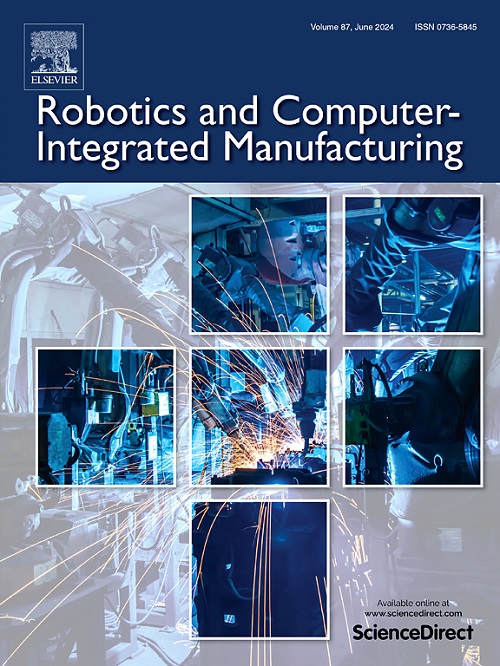CCM-FCC: LLM-powered cognition-centered AI agent framework for proactive human-robot collaboration
IF 11.4
1区 计算机科学
Q1 COMPUTER SCIENCE, INTERDISCIPLINARY APPLICATIONS
引用次数: 0
Abstract
Proactive human-robot collaboration (PHRC) primarily relies on predefined rule-based integration of perception, analysis and decision-making into a unified framework, which limits its autonomy and interactivity in dynamic scenarios such as disassembly and assembly. Although AI agent equipped with memory and interaction functions exhibits enhanced adaptability, their task-specific designs result in a lack of holistic cognition, thereby limiting their generalization capability. This paper proposes a Large Language Model (LLM)-powered cognition-centered AI agent framework, which addresses these challenges through the “Cognitive Core Management–Functional Cluster Collaboration” (CCM-FCC) paradigm. Specifically, to enhance the generalization capability of the AI agent, we developed a semantic Chain-of-Thought (CoT) prompt learning-driven cognitive core for predicting key task factors. The semantic CoT prompt learning, which couples task semantics with reasoning logic, empowers the pre-trained LLM to improve the key factors prediction. Subsequently, to ensure centralized management of the cognitive core, we designed a dual-dimensional feature-constrained functional activation module. It extracts task semantic cues from the key factors and autonomously activates functional modules within the AI agent, constrained by task complexity and operator state. Furthermore, a task-semantic-driven functional cluster collaboration module is proposed to generate the optimal collaboration strategy. Finally, a deep reinforcement learning model is constructed to enable the robot to proactively collaborate with the operator for PHRC. The experiments on HRC tasks demonstrates the effectiveness of the proposed method.
CCM-FCC:基于llm的主动人机协作认知中心AI代理框架
主动人机协作(PHRC)主要依赖于预定义的基于规则的感知、分析和决策集成到一个统一的框架中,这限制了其在拆卸和组装等动态场景中的自主性和交互性。虽然具有记忆和交互功能的人工智能智能体具有较强的适应性,但其特定任务的设计导致其缺乏整体认知,从而限制了其泛化能力。本文提出了一个基于大语言模型(LLM)的以认知为中心的人工智能代理框架,该框架通过“认知核心管理-功能集群协作”(CCM-FCC)范式解决了这些挑战。具体而言,为了提高人工智能智能体的泛化能力,我们开发了一个语义思维链(CoT)提示学习驱动的认知核心,用于预测关键任务因素。语义CoT提示学习将任务语义与推理逻辑相结合,使预训练的LLM能够提高关键因素的预测能力。随后,为了保证认知核心的集中管理,我们设计了一个二维特征约束的功能激活模块。它从关键因素中提取任务语义线索,并在任务复杂性和操作员状态的约束下自主激活人工智能代理内的功能模块。在此基础上,提出了一个任务语义驱动的功能集群协同模块来生成最优协同策略。最后,构建了一个深度强化学习模型,使机器人能够主动与操作员协作进行PHRC。在HRC任务上的实验验证了该方法的有效性。
本文章由计算机程序翻译,如有差异,请以英文原文为准。
求助全文
约1分钟内获得全文
求助全文
来源期刊
CiteScore
24.10
自引率
13.50%
发文量
160
审稿时长
50 days
期刊介绍:
The journal, Robotics and Computer-Integrated Manufacturing, focuses on sharing research applications that contribute to the development of new or enhanced robotics, manufacturing technologies, and innovative manufacturing strategies that are relevant to industry. Papers that combine theory and experimental validation are preferred, while review papers on current robotics and manufacturing issues are also considered. However, papers on traditional machining processes, modeling and simulation, supply chain management, and resource optimization are generally not within the scope of the journal, as there are more appropriate journals for these topics. Similarly, papers that are overly theoretical or mathematical will be directed to other suitable journals. The journal welcomes original papers in areas such as industrial robotics, human-robot collaboration in manufacturing, cloud-based manufacturing, cyber-physical production systems, big data analytics in manufacturing, smart mechatronics, machine learning, adaptive and sustainable manufacturing, and other fields involving unique manufacturing technologies.

 求助内容:
求助内容: 应助结果提醒方式:
应助结果提醒方式:


